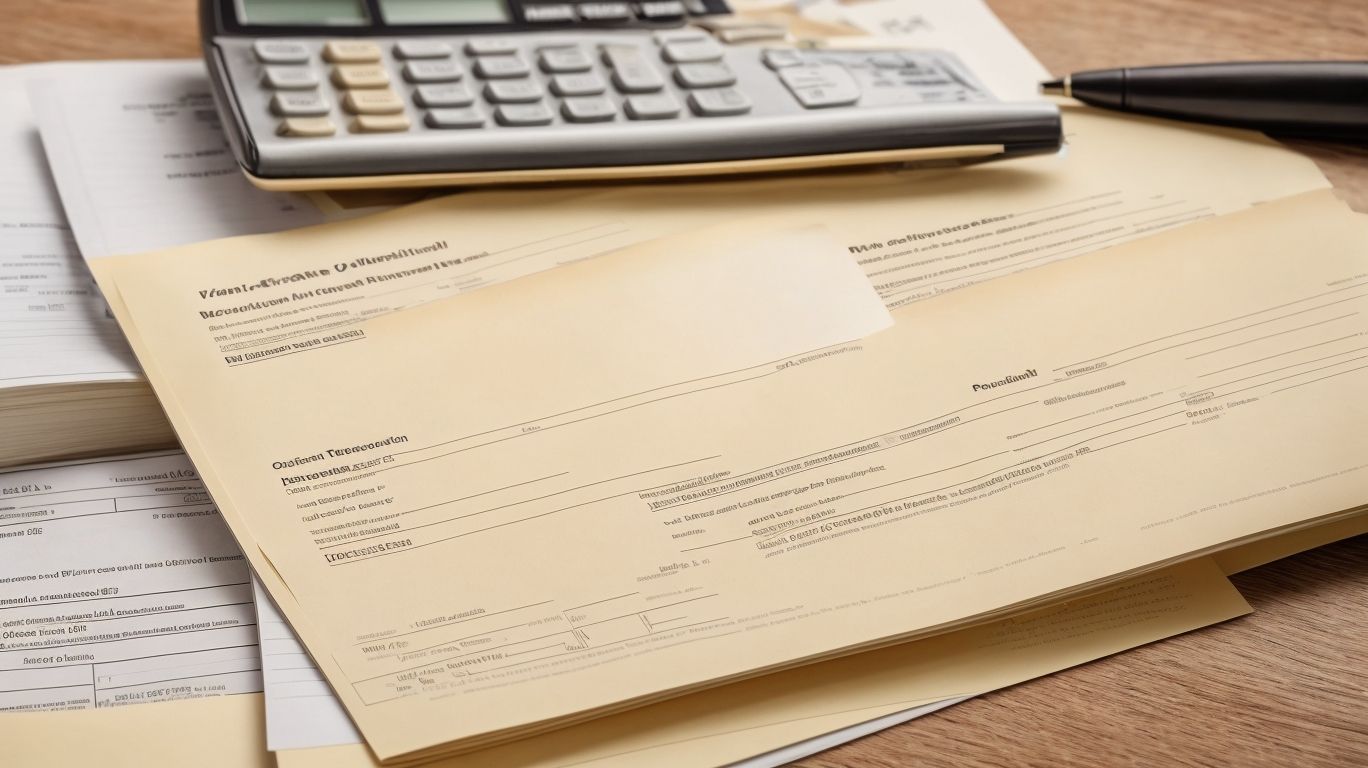In today’s fast-paced world, keeping track of financial records is essential for individuals and businesses alike. However, with complex tax laws and changing financial regulations, it can be a daunting task. Yet, accurate financial records are crucial for making informed financial decisions and avoiding penalties. Are you struggling to keep your financial records in order? Let us help alleviate your worries.
What Are Financial Records?
Financial records refer to the documents and data that detail an organisation’s financial activities and transactions. They provide a comprehensive overview of the company’s financial health, including income, expenses, assets, liabilities, and equity. These records are crucial for meeting regulatory requirements, preparing financial statements, and making informed business decisions.
Examples of financial records include:
- balance sheets
- income statements
- cash flow statements
- bank statements
- invoices
- receipts
- tax records
Maintaining accurate financial records is essential for demonstrating transparency, complying with tax laws, securing funding, and assessing the company’s performance. They serve as evidence in the event of audits, disputes, or legal proceedings, and also aid in identifying trends, detecting errors, and evaluating the effectiveness of financial strategies.
Why Are Accurate Financial Records Important?
Accurate financial records are a vital component of any successful business or organisation. In this section, we will discuss the reasons why maintaining precise financial records is crucial for the overall health and success of a company. From budgeting and planning to compliance with laws and regulations, accurate financial records play a significant role in various aspects of a business. Furthermore, we will explore how these records can facilitate informed decision making and drive the growth of a company.
1. Helps with Budgeting and Planning
- Assess Financial Status: Review current income, expenses, and financial goals.
- Create Realistic Budget: Based on the assessment, allocate funds for essential needs, savings, and discretionary spending.
- Track Expenses: Monitor all expenditures to ensure they align with the budget and identify areas for adjustment.
- Plan for Future Expenses: Anticipate upcoming costs and incorporate them into the budget to avoid financial strain.
- Adjust Budget as Needed: Regularly revisit the budget to reflect changes in income, expenses, or financial goals.
In the early 20th century, the implementation of modern budgeting and planning techniques revolutionised business management, enabling companies to forecast and control their financial activities more effectively.
2. Ensures Compliance with Laws and Regulations
Understand Applicable Laws and Regulations:
Familiarise yourself with the specific laws and regulations relevant to your industry and location.
Implement Internal Controls:
Establish internal controls to ensure compliance with financial laws and regulations, such as segregation of duties and regular audits.
Engage Legal and Financial Professionals:
Seek legal and financial advice from professionals to ensure that your operations and financial records align with the established laws and regulations.
It’s crucial to stay updated on evolving laws and regulations and regularly assess your compliance efforts to avoid penalties or legal issues.
3. Facilitates Decision Making
Analyse Financial Data: Utilise accurate financial records to assess the company’s current financial status, evaluate profitability, and identify areas for improvement.
Support Strategic Planning: Use financial records to make informed decisions about expansion, investment opportunities, and resource allocation.
Evaluate Performance: Compare financial records over different periods to track company performance and identify trends that can guide future strategies.
Pro-tip: When facilitating decision-making with financial records, ensure that the data is up-to-date and comprehensive to make well-informed and impactful decisions.
What Are the Consequences of Inaccurate Financial Records?
Maintaining accurate financial records is crucial for any business or individual. However, the consequences of having inaccurate financial records can be significant and far-reaching. In this section, we will delve into the potential repercussions of not keeping precise records. From legal and financial penalties to loss of credibility and trust, we will explore the potential consequences of inaccurate financial records. Additionally, we will discuss how it can make obtaining loans or investments more challenging.
1. Legal and Financial Penalties
Ensure Compliance: Adhere to all relevant laws and regulations governing financial record-keeping, such as tax laws, accounting standards, and reporting requirements.
Seek Legal Counsel: When in doubt about legal and financial aspects, consult legal or financial professionals to ensure accuracy and compliance.
Regular Audits: Conduct regular internal or external audits to identify and rectify any inaccuracies or potential compliance issues.
Training and Education: Invest in training for employees responsible for financial record-keeping to stay updated with changing regulations and best practices.
Documentation: Keep thorough documentation of all financial transactions and decisions to demonstrate compliance and accuracy.
It’s crucial to prioritise accuracy and compliance in financial record-keeping to avoid legal and financial penalties. Regular training, professional guidance, and meticulous documentation can help mitigate risks and ensure adherence to laws and regulations.
2. Loss of Credibility and Trust
Loss of credibility and trust can have detrimental effects on a business or individual. Inaccurate financial records can lead to eroding confidence among stakeholders, including clients, investors, and financial institutions. When financial information is unreliable, it can result in skepticism and reluctance to engage in transactions or partnerships, ultimately impacting the overall success and sustainability of the entity.
Moreover, the tarnished reputation caused by discrepancies in financial records may take substantial time and effort to rebuild, potentially leading to lasting repercussions.
3. Difficulty Obtaining Loans or Investments
Improve credit score: Maintain a good credit score by paying bills on time and reducing outstanding debt to alleviate the difficulty in obtaining loans or investments.
Build strong financial statements: Create accurate and detailed financial records, including balance sheets, income statements, and cash flow statements, to present a clear financial picture to potential lenders or investors.
Establish a positive banking relationship: Foster a strong relationship with your bank by maintaining regular communication and transparent financial records, which can improve the chances of obtaining loans or securing investments.
How Can You Maintain Accurate Financial Records?
As a business owner or individual, maintaining accurate financial records is crucial for making informed decisions and staying on top of your financial health. In this section, we will discuss practical and effective ways to maintain accurate financial records. From utilising accounting software to seeking professional help, we’ll cover all the essential steps to ensure your records are thorough and organised. By the end, you’ll have a comprehensive understanding of how to keep your finances in order.
1. Use Accounting Software
Select the right accounting software for your business needs and size. Look for user-friendly interfaces, essential features like invoicing, expense tracking, and financial reporting, and compatibility with your operating system.
Customize the software to fit your business processes. Set up chart of accounts, tax rates, and payment terms according to your company’s requirements.
Regularly update the software to ensure you have the latest features and security patches. Back up your data to prevent loss due to technical issues or cyber threats.
Provide training to your team to ensure they effectively use the software. This will help streamline financial record-keeping and minimize errors.
Once, a small business owner struggled with manual bookkeeping until implementing accounting software, which not only saved time but also improved accuracy, leading to better financial decision-making.
2. Keep Detailed and Organized Records
Implement a systematic filing system for all financial documents, such as invoices, receipts, and bank statements, ensuring easy access and retrieval.
Utilise accounting software to categorise and store financial records electronically, enabling efficient organisation and retrieval of data.
Regularly update and review financial records to identify any discrepancies or errors, ensuring accuracy and completeness.
Establish clear procedures for record-keeping, including guidelines for documenting transactions, managing accounts payable and accounts receivable, and reconciling bank statements.
3. Regularly Reconcile Accounts
Regularly reconciling accounts is crucial for maintaining accurate financial records. Follow these steps to ensure thorough reconciliation:
- Compare financial transactions in the accounting records with bank statements.
- Investigate and resolve any discrepancies between the two sets of records.
- Document any adjustments made during the reconciliation process.
- Regularly review and update the reconciliation process to adapt to any changes in financial activities or accounts.
By consistently reconciling accounts, businesses can identify and rectify errors, prevent fraudulent activities, and maintain financial integrity.
4. Seek Professional Help if Needed
Assess Your Needs: Evaluate the complexity of your financial records and the time you can dedicate. Determine if you require assistance with tax preparation, financial statements, or other specialised tasks.
Research Professionals: Look for certified public accountants (CPAs), enrolled agents, or other qualified professionals. Check their credentials, experience, and client reviews.
Consultation: Schedule consultations with potential professionals to discuss your requirements, fees, and the scope of services they offer.
Agreement and Communication: Once you identify a suitable professional, establish a clear agreement outlining the services, fees, and timelines. Maintain open communication for any updates or changes in your financial situation.





